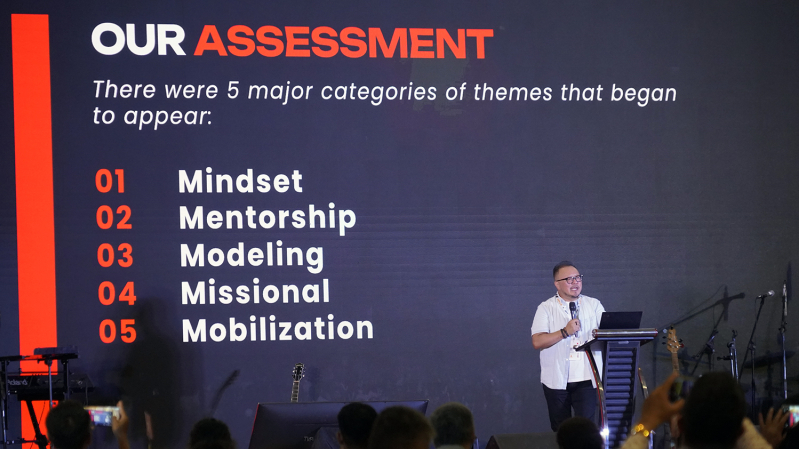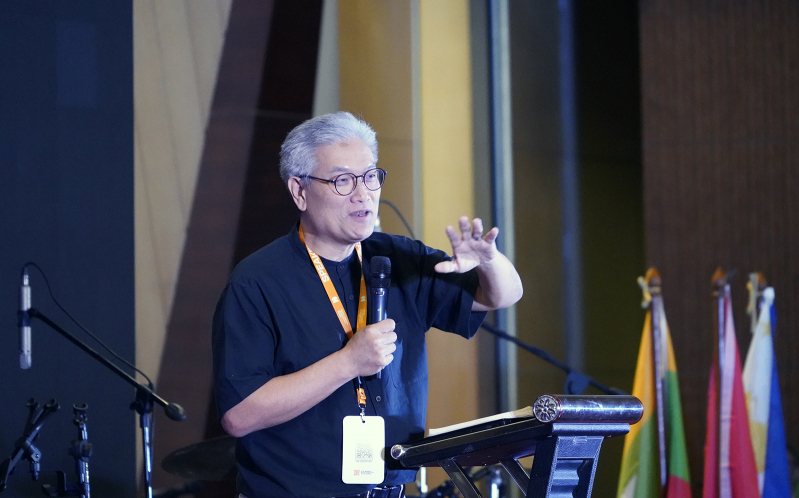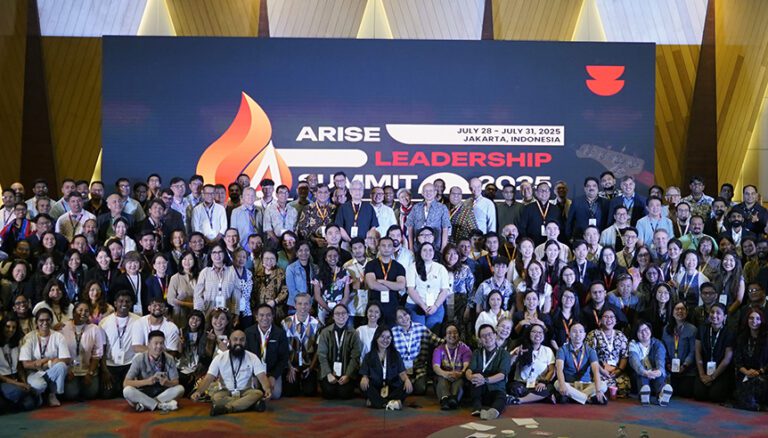The Arise Leadership Summit 2025 was concluded on Thursday, July 31, with a detailed presentation of participants-generated insights and a clear call for ongoing collaboration to mobilise the next generation of mission leaders in Asia.
The four-day gathering in Jakarta, Indonesia attracted nearly 300 participants from 22 countries to reflect, strategy and pray about the future of missions in each context.
Rev. Seth Kim, co-founder and vice president of Arise Asia, gave a main presentation during the final session, summarizing the results of the open space conversation and breakout group held earlier in the week. The findings were constructed as “living documents.” Although not final, it already points to the core values and collective direction of movement.
Rev. David Ro, executive director and co-founder of Arise Asia, stressed that the summit’s conclusions were not an endpoint, but the beginning of a new season of the Arise movement. He invited national leaders and local moves to actively prepare for their next major event, the Arise Asia 2026 Congress, to be held in Bangkok, Thailand.
The collaborative process provides five important themes
During his address, Kim explained the data integration process used by the Arise team. Participant feedback was collected through World Cafe sessions and open space group conversations. The data was then aggregated using AI tools and reviewed by a human team to ensure accuracy and theme integrity.
“This is not the last word,” Kim said. “This is a working document that reflects what we have heard. More revisions will continue as we continue to listen to your opinions and the guidance of the Holy Spirit.”

This integration led to five comprehensive themes: Mindset, mentorship, modeling, mission living, and mobilization are collectively mentioned as “Five Ms.”
According to Kim, each category represents the necessary elements of a healthy mission ecosystem rooted in biblical principles and contextual reality.
Thinking: Changing your thinking about missions
The first theme addressed the need to structure mission work and reconstruct the general attitude about who is being called to participate. The drawing from Romans 12:2 emphasized the importance of updating and moving one’s mind, beyond the outdated or overly narrow definition of missions.
He warned of two extremes. The mission is to simply dilute the intercultural, full-time transmission, or to very dilute the term, and Christian activities are considered missionary.
“If everything is a mission, then nothing is a mission,” Kim said. “We must maintain a focused commitment to a group of people who do not reach, confirming that God is calling on all believers to participate in his mission.”
Participants frequently emphasized the need for better theological education and awareness in the church to help members understand both the biblical basis of the mission and the urgency of global gospel work.
In the response, participants wrote: “We have to start with thinking. But who can really change that? Only God can change our minds.
Mentorship: Pass the baton intentionally
The second theme, mentorship, emerged consistently throughout the summit discussions. Both younger and older participants emphasized the importance of intergenerational disciples in relations as a key tool for leadership development.
Kim encouraged older leaders to seek mentoring initiatives and young leaders to ask for guidance to protect their passive. See 2 Timothy 2:2, he sought a multi-generational chain of disciples.
“Mentership must be intentional and related,” he said. “It’s not about programs. It’s about people walking together throughout life and learning through examples.”
One participant said, “Gen ZS is not an object. They are the subject. It is not to cultivate us to be missionary, but to rise to the missionary power that God desires.”
Another said, “Be passionate about the beauty of God’s redeeming plan, and they will come. But first, they must see it in our lives.”
Kim urged leaders to invest their time not only in public education but also in personal modeling and private conversations that shape emerging leaders.
Modeling: Christlike leadership across generations
The third theme, modeling, pointed to the role of veteran leaders in setting examples of integrity, humility and loyalty. Kim pointed out that many participants spoke openly about “the wounds of the church” and disillusionment with leadership. These stories pointed to the importance of character development in leadership, not just ministry skills.
1 Corinthians 11:1 – refers to “following my example while following Christ’s example.”
Young participants expressed their desire to embody mentoring not only teaching the gospel in family life, work and community engagement.
“If we really want to go to young people,” one submission said, “They must see our lives filled with prayer, love and service.”
Modeling also includes mental parenting. Several participants highlighted the need for spiritual fathers and mothers, especially in a culture characterized by fractured family structures.
“We need a respectful family and a home,” Kim said. “And when they go missing, the church must step in to model the meaning of following Christ in the community.”
Missionary Life: Commitment to the Grand Committee
The fourth theme, Missional Living, centers around how Christians integrate the Grand Commission into their daily lives. Participants agreed that expressions of both local and intercultural missions were required.
Kim referred to Matthew 28:19–20, highlighting that the order to “make disciples of all nations” requires active involvement in a variety of settings, including churches, schools, workplaces, and online platforms.
He encouraged participants to think beyond traditional ministry models and consider new opportunities for gospel engagement, particularly in digital spaces.
“Some of today’s most effective evangelism is happening on Tiktok and other social media platforms,” Kim said. “We need to equip young people in these arenas to salt and light.”
One participant said, “Sends are church-wide, community-wide activities. We need parents to raise children who are supported to follow their mission call. We need entrepreneurs to fund missions. We need church structures to equip and maintain them.”
Kim confirmed this ecosystem approach as essential to maintaining long-term mission impacts.
Mobilization: Turning inspiration into action
The final theme, Mobilization, focused on how summit inspiration could be translated into practical next steps. Kim recognized the common challenge with the meeting. After participants return home, emotional and mental momentum often fades away.
He shared his experiences as a college student whose life changed by a short mission trip to Africa. “We did nothing extraordinary,” he said.
Kim highlighted the importance of follow-up, short-term exposure, and mobilization of local and global teams. He suggested that movements across each country aim to send one local team and one international team next year.
“The event is important,” he said. “But the movement is maintained by the next step.”
Participants were encouraged to think essentially through prayer, training, internships and church involvement.
“The harvest is abundant, but there are few workers,” Kim reminded the audience and quoted Matthew 9.
RO: “We are just a small part of God’s greater mission.”
In his final speech, Pastor David Roe reviewed the findings and thanked Kim and the Alice team for their integration work. He also acknowledged that tension leaders feel they are in balancing vision, faith and logistical reality.
Quoting Psalm 112, Ro emphasized that joy and stability come from trusting in God, even in seasons of uncertainty. He openly shared his own internal wrestling with concern for the future, noting that leadership often involves navigating both faith and fear.

“This week reminded me that this isn’t my move,” Ro said. “It belongs to God, and we trust him in what comes next.”
RO has strengthened Asia as a platform for collaboration rather than a centralized organization or solution. “We are just a small part of Christ’s global body,” he said. “Our job is to faithfully play our role.”
Generational unity: pray together, pass the baton
One of the most moving moments of the summit happened the night before older participants prayed for the younger generations, placed their hands on them and spoke words of encouragement. The young participants then returned their blessings and prayed to the elders in a symbolic exchange of symbolic honor and shared purpose.
The interaction captured the spirit of this week. It repeatedly emphasized the need for both generations to walk together.
“I’m grateful that the older generation said, ‘It’s your turn to take the baton and run,'” said one Gen Z attendee. “But when someone told me it made even more sense.
Another participant recalls the dynamics of the conference and says, “In the beginning it felt like we were being analyzed like species. But I saw that older generations really want to understand and support us.
The 19-year-old attendee, perhaps the youngest participant, said, “Sometimes I feel misunderstood by older generations, but I also see that their minds are in the right place.
Looking forward to the outbreak of Asia in 2026
Kim and RO emphasized that Arise Asia 2026 Congress in Bangkok serve as an important milestone in a broader journey that mobilizes the next generation.
Congress is assumed not as a standalone event but as a continuation of the movement’s long-term priorities. We will develop young mission-oriented leaders, strengthen intergenerational partnerships, and create a sustainable, locally rooted mission ecosystem across Asia.
RO emphasized that future gatherings must be fixed in collective ownership by grassroots disciples and national movements. “This is not a Western-funded initiative,” he said. “If we are a region that truly saves missions, we need to build infrastructure and take ownership of our vision.”
He said many national leaders already plan to send both local and global mission teams with lead-ups through 2026, highlighting the need for coordinated efforts between churches, mission agencies and local moves to prepare young people for long-term involvement.
“This summit was not a conclusion,” Ro said. “It was a test run.”
